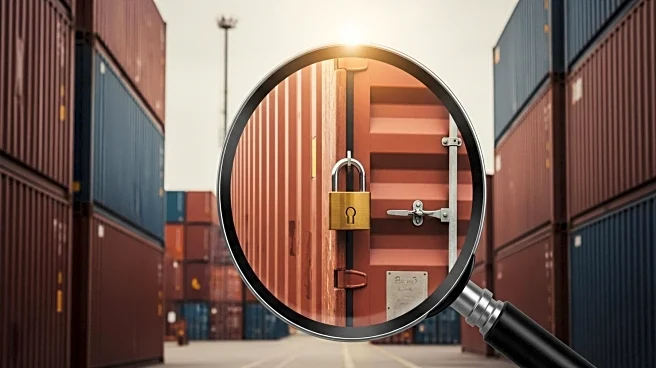What is the story about?
What's Happening?
A significant operation at the Port of Piraeus in Greece has led to the arrest of customs officers and the seizure of thousands of containers filled with illegally imported goods from China. The European Public Prosecutor’s Office (EPPO) has charged six individuals, including two customs officers, with involvement in criminal networks responsible for importing goods fraudulently into the EU. The operation, code-named 'Calypso,' resulted in the seizure of 2,435 containers containing e-bikes, textiles, and footwear, marking the largest illegal goods seizure to date. The investigation revealed that these networks, primarily controlled by Chinese nationals, have been evading customs duties and VAT through misclassification and undervaluation of goods. The Port of Piraeus has become a key entry point for these illicit activities, facilitated by professional enablers who assist in bypassing customs regulations.
Why It's Important?
The seizure of illegal goods at Piraeus highlights the ongoing challenges faced by the EU in combating customs fraud and protecting its market. The fraudulent importation of goods has resulted in significant financial losses, estimated at hundreds of millions of euros in customs duties and VAT. This operation underscores the need for enhanced cooperation and enforcement measures to address organized crime networks that exploit international trade systems. The EU's efforts to impose anti-dumping duties on imports from China reflect broader trade tensions and the complexities of maintaining fair trade practices. The arrests and seizures serve as a warning to those involved in illegal trade activities and demonstrate the EU's commitment to safeguarding its economic interests.
What's Next?
The investigation into the illegal importation of goods is ongoing, with further inspections of the seized containers expected to reveal additional fraudulent practices. The EPPO is likely to continue its efforts to dismantle the criminal networks involved and prevent future occurrences of customs fraud. The EU may also consider strengthening its trade policies and enforcement mechanisms to better protect its market from illicit activities. The outcome of this operation could influence future trade relations with China and other countries, as the EU seeks to balance economic interests with the need for fair and transparent trade practices.
Beyond the Headlines
The illegal goods seizure at Piraeus raises broader questions about the effectiveness of international trade regulations and the challenges of enforcing them across borders. The involvement of organized crime networks in customs fraud highlights the need for comprehensive strategies that address both legal and illegal aspects of global trade. The situation also underscores the importance of international cooperation in combating economic crimes and protecting market integrity. As trade becomes increasingly globalized, countries must navigate complex legal and regulatory frameworks to ensure fair competition and prevent exploitation by criminal entities.














